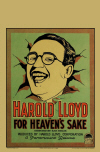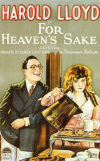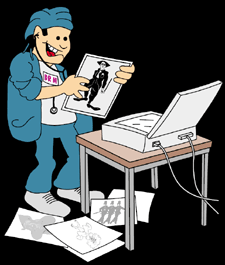|

 Brother
Paul and his daughter, Hope, are poor but kindly missionaries who own a
street cart which provides coffee and doughnuts to the derelicts on a
downtown street. Uptown, J. Harold Manners has bought a new car to
match his white pants. James, Harold's chauffeur, swerves to avoid what he
thinks is a live animal (it's the picture of a cat on a box in the street),
and smashes head-on into a truck. Manners dismisses James, and walks
into a car showroom, where he plucks down a check for $9,000 for the most
ornate car available. Brother
Paul and his daughter, Hope, are poor but kindly missionaries who own a
street cart which provides coffee and doughnuts to the derelicts on a
downtown street. Uptown, J. Harold Manners has bought a new car to
match his white pants. James, Harold's chauffeur, swerves to avoid what he
thinks is a live animal (it's the picture of a cat on a box in the street),
and smashes head-on into a truck. Manners dismisses James, and walks
into a car showroom, where he plucks down a check for $9,000 for the most
ornate car available.
As he rounds the corner in his second new car of
the day, police commission him to help chase down some criminals. As
the bullets fly, the car runs out of gas, and conks out—upon train tracks. As Harold bends to crank the car back to life, a
train speeds the car out of sight, leaving Harold holding a most lonely
crank. He grabs his coat, and a light for his smoke, out of the
wreckage of his former luxury auto, and walks home.
Meanwhile, Hope reads in the paper of the
wealthy Manners, and decides to write to him, asking for a donation to her
father's mission. The letter arrives, but Manners' secretary throws it
away.
Later, Harold is downtown, looking for the
Grotto Cafe, and happens into a pool hall to ask for directions. On
his way, he lights a cigarette, tosses the match mindlessly, and ignites
Brother Paul's coffee cart. Harold wants to reimburse for the loss,
and asks, "How much?" Brother Paul, thinking he wants to help build
the mission, answers $1,000. Hope sees the check, and believes that
Manners has answered her request for help. The money goes towards a
permanent new home for "The J. Harold Manners Mission."
When he reads of his religious philanthropy in
the paper, Harold is incensed, and heads back downtown to protest.
Hope, seeing him tearing down the mission sign (but not knowing who he is),
reprimands him heartily—Harold falls instantly in love with her spirit and
spunk. He is invited to tour the mission, responding, "Very pretty" to
everything Hope shows him. The pomposity of J. Harold Manners'
personality has now taken a 180-degree turn for the better, and he now helps
Hope in the mission. Hope is distressed, however, because
none of the neighborhood mugs ever attend the services, so Harold offers to
help round them up. After coming up empty at the pool hall, Harold
devises an ingenious plan to have the thugs chase him to the mission:
on the street, he will anger a rough-looking man, who will chase him.
On the way, Manners will step on some other bum's foot, or kick another
tough in the rear, and they will join in the chase. Eventually, all
the thugs in town are chasing Harold, who ducks into the mission, followed
by all the toughs. Once there,
they all scoff, but when they learn that the cops are outside, they fight
for the hymnals. In time, the rough guys soften and, with Harold's
help, begin to be rehabilitated, getting jobs, and living cleaner lives.
Hope is grateful, love is soon flowering for her and Harold, and a marriage
is planned.
Later, a newspaper headline reads, "Millionaire
Clubman to Marry Mission Worker." His pals at the country club,
certain it must be an error, plot to save Harold by kidnapping him.
The wedding reception committee, comprised of five mugs in tuxedos, hear one
of Harold's kidnappers yell that the wedding is off—dejected, feeling
foolish for having accepted Harold, they decide to have a few drinks to calm
down. They become hopelessly inebriated, and later decide to rescue
Harold, but arrive at the club in a drunken stupor—they are tackled by the
elegant clubmen, but are victorious in rescuing their Mr. Manners.
Harold calls a worried Hope: "I was kidnapped, Honey, and may be a
little late."
It is a real struggle to get the drunken hobos
back to the mission—Harold resembles a man walking five big dogs—they travel
on a trolley, a double-decker bus, and finally a dog
wagon, but they finally do arrive. Harold and Hope are married, with
Harold absentmindedly slipping Hope's ring on a puppy's tail.
Notes
The reviews of For Heaven's Sake
were uniformly good: The Film Daily, in its April 11, 1926, issue,
wrote, "Here's Lloyd in another that looks mighty sweet for the box-office.
Funny gags, snappy tempo, and a minimum of footage. All mean for a
money-maker." The critique in the April 19, 1926, issue of Time was,
in a roundabout way, a high compliment: "Mr. Lloyd has done better
pictures; there are only three or four comedians that could possibly do as
good a one as this."
In August 1916, Harold celebrated the completion
of his first year of the Lonesome Luke comedies by buying a new car for
$1,250. That same day, driving the car for the first time, he ran it
up a tree, totaling it. That night, he sold the wreckage for $100.
This event was a sure influence on the beginning of For Heaven's Sake.
This was the fourth most popular film of 1926,
In his character of J. Harold Manners, Lloyd appeared on the cover of the
April 1, 1926, issue of Balaban & Katz magazine, a Paramount house organ.
The film grossed $2,591,460. Some of the location sequences were shot
on the grounds of the Hotel Ambassador in Los Angeles. The famed
natatorium
of the hotel furnished the beautiful interior shots.
Though a silent feature, there were many songs
featured in For Heaven's Sake. `Just Break the News to Mother,"
"Onward Christian Soldiers," "I'm Falling in Love with Someone," and "Sweet
Adeline"—all were made known through shots of sheet music and titles, mostly
inside the mission. An original song was inspired by the film, "For
Heaven's Sake," lyrics by Al Bryan and music by Hugo Frey, © 1926 by
Robbins-Engel, Inc.
Paramount's press kit for the film included
certificates, personally autographed by Harold, for inclusion in "The For
Heaven's Sake Club." Members "pledged to help those who cannot help
themselves and to do a good turn whenever occasion rises."
The naming of this film was a challenge for
Lloyd and company, but was finally decided out of sheer luck. As was
procedure, the gag men and Harold were pow-wowing, trying to come up with a
title for this new picture. Finally, one exasperated member of the
group threw his hands up in the air and cried, "Oh, for Heaven's sake!"
Harold chose For Heaven's
Sake right then and there, particularly since, among others, that was one of
his favorite catch phrases.
The climactic chase scene featured a thrilling ride on a double-decker
open-top bus. There were no process shots used; the bus was built on
top of a truck, on rollers. It swayed quite violently, yet safely.
Noah Young, who in that sequence did a drunken tightrope walk on the bus
railing was, actually, braced onto the bus by one leg, so there was no real
danger.
For Heaven's Sake, at six reels, was the last
feature under eight reels that Lloyd would star in (actually, the film was
originally seven reels in length, but was cut by a reel after previews were
disappointing). This was also the final film in which Harold's
character was rich. |
